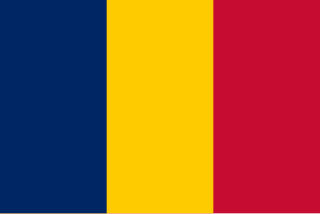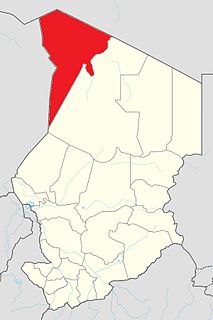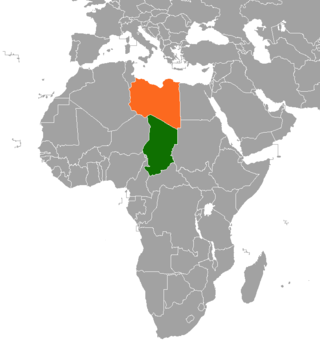Pierre Galopin was a French military officer who came to international attention when he was captured by a group of Chadian rebels, led by Hissène Habré, on 4 August 1974 in the Tibesti mountains, in the middle of the Sahara desert. He was tried by a "revolutionary tribunal", sentenced to death on 26 December 1974 and, on 4 April 1975, executed by hanging.

France, officially the French Republic, is a country whose territory consists of metropolitan France in Western Europe and several overseas regions and territories. The metropolitan area of France extends from the Mediterranean Sea to the English Channel and the North Sea, and from the Rhine to the Atlantic Ocean. It is bordered by Belgium, Luxembourg and Germany to the northeast, Switzerland and Italy to the east, and Andorra and Spain to the south. The overseas territories include French Guiana in South America and several islands in the Atlantic, Pacific and Indian oceans. The country's 18 integral regions span a combined area of 643,801 square kilometres (248,573 sq mi) and a total population of 67.3 million. France, a sovereign state, is a unitary semi-presidential republic with its capital in Paris, the country's largest city and main cultural and commercial centre. Other major urban areas include Lyon, Marseille, Toulouse, Bordeaux, Lille and Nice.

Chad, officially the Republic of Chad, is a landlocked country in north-central Africa. It is bordered by Libya to the north, Sudan to the east, the Central African Republic to the south, Cameroon and Nigeria to the southwest, and Niger to the west. It is the fifth largest country in Africa and the second-largest in Central Africa in terms of area.

Hissène Habré, also spelled Hissen Habré, is a Chadian politician who served as the President of Chad from 1982 until he was deposed in 1990. He was brought to power with the support of France and the United States, who provided training, arms and financing.
Commandant Galopin had been sent to the north of Chad to negotiate the release of Françoise Claustre, and her fellow hostages, by the French and Chadian governments. However, it has been alleged that he had a second mission, which was to encourage dissent among the rebels, and it was for this, together with his involvement in the interrogation of captured rebels using torture, that he had been condemned. The extent of Hissène Habré's involvement in his death is also disputed. It has also been claimed that Galopin was a member of the Françafrique network, led by Jacques Foccart.
Françoise Claustre, was a French archeologist who was taken hostage by a group of Chadian rebels, led by Hissène Habré, on 20 April 1974, at Bardaï, in the Tibesti Mountains of northern Chad. At the same time, the rebels also seized a German doctor, Christophe Staewen, and Marc Combe, who was an assistant of Mrs. Claustre's husband, Pierre.

Françafrique is France's relationship with its former African colonies. It was first used in a positive sense by President Félix Houphouët-Boigny of Côte d'Ivoire, in allusion to that country's economic growth and political stability under its alliance with France. However, the term is now often used to criticise the allegedly neocolonial relationship France has with its former colonies in Africa. Since the independence of African states in 1960, France has intervened militarily more than 30 times in the continent. France has military bases in Gabon, Senegal and Djibouti, as well as in its overseas departments of Mayotte and Réunion in the Indian Ocean. The French Army is also deployed in Mali, Chad, Central African Republic, Somalia and Ivory Coast. Françafrique was at its height from 1960 to 1989, and there is an ongoing dispute as to whether or not it still exists. In 2012 and 2013, some news outlets spoke of a "return of Françafrique". On 14 July 2013, troops from 13 African countries marched with the French military during the Bastille Day parade in Paris for the first time since French colonial troops were dissolved.
Jacques Foccart was a chief adviser for the government of France on African policy as well as the co-founder of the Gaullist Service d'Action Civique (SAC) in 1959 with Charles Pasqua, which specialized in covert operations in Africa.
When he went on his final mission, Galopin was deputy to Camille Gourvenec, both as deputy commander of the Nomad and National Guard, and as deputy security adviser to the President of Chad, François Tombalbaye. Galopin had spent most of his professional career in the Sahara Desert, first distinguishing himself with operations in Mauritania, and was in Chad during much of the period from independence in 1960 until his death.
Camille Gourvenec was an officer of the French external intelligence service SDECE, possibly with the rank of colonel, who, from 1966, was seconded as security adviser to President François Tombalbaye of Chad, and was therefore effectively head of Tombalbaye's security and intelligence service. He had previously served with the French forces in Algeria. It has been alleged that he was a key member of the Françafrique network, led by Jacques Foccart.

François Tombalbaye, also known as N'Garta Tombalbaye, was a Chadian teacher and a trade union activist who served as the first president of Chad. The head of Chad's colonial government and its ruling party, the Chadian Progressive Party, after 1959, Tombalbaye was appointed the nation's head of government after its independence on August 11, 1960. He ruled as a dictator until his deposition and assassination by members of the Chadian military in 1975.

Mauritania is a country in Northwest Africa. It is the eleventh largest sovereign state in Africa and is bordered by the Atlantic Ocean to the west, Western Sahara to the north and northwest, Algeria to the northeast, Mali to the east and southeast, and Senegal to the southwest.
His remains were returned to France after Idriss Déby came to power.

General Idriss Déby Itno is a Chadian politician who has been the President of Chad since 1990. He is also head of the Patriotic Salvation Movement. Déby is of the Bidyat clan of the Zaghawa ethnic group. He took power at the head of a rebellion against President Hissène Habré in December 1990 and has since survived various rebellions against his own rule. He won elections in 1996 and 2001, and after term limits were eliminated he won again in 2006, 2011, and 2016. He added "Itno" to his surname in January 2006. He is a graduate of Muammar Gaddafi's World Revolutionary Center.




